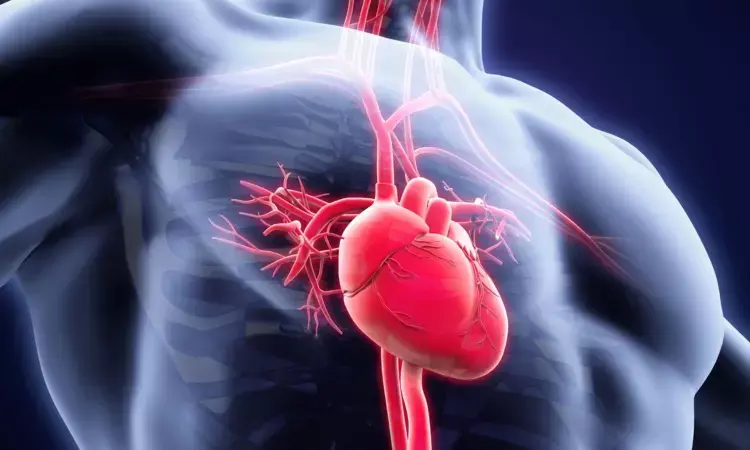- Home
- Medical news & Guidelines
- Anesthesiology
- Cardiology and CTVS
- Critical Care
- Dentistry
- Dermatology
- Diabetes and Endocrinology
- ENT
- Gastroenterology
- Medicine
- Nephrology
- Neurology
- Obstretics-Gynaecology
- Oncology
- Ophthalmology
- Orthopaedics
- Pediatrics-Neonatology
- Psychiatry
- Pulmonology
- Radiology
- Surgery
- Urology
- Laboratory Medicine
- Diet
- Nursing
- Paramedical
- Physiotherapy
- Health news
- Fact Check
- Bone Health Fact Check
- Brain Health Fact Check
- Cancer Related Fact Check
- Child Care Fact Check
- Dental and oral health fact check
- Diabetes and metabolic health fact check
- Diet and Nutrition Fact Check
- Eye and ENT Care Fact Check
- Fitness fact check
- Gut health fact check
- Heart health fact check
- Kidney health fact check
- Medical education fact check
- Men's health fact check
- Respiratory fact check
- Skin and hair care fact check
- Vaccine and Immunization fact check
- Women's health fact check
- AYUSH
- State News
- Andaman and Nicobar Islands
- Andhra Pradesh
- Arunachal Pradesh
- Assam
- Bihar
- Chandigarh
- Chattisgarh
- Dadra and Nagar Haveli
- Daman and Diu
- Delhi
- Goa
- Gujarat
- Haryana
- Himachal Pradesh
- Jammu & Kashmir
- Jharkhand
- Karnataka
- Kerala
- Ladakh
- Lakshadweep
- Madhya Pradesh
- Maharashtra
- Manipur
- Meghalaya
- Mizoram
- Nagaland
- Odisha
- Puducherry
- Punjab
- Rajasthan
- Sikkim
- Tamil Nadu
- Telangana
- Tripura
- Uttar Pradesh
- Uttrakhand
- West Bengal
- Medical Education
- Industry
CMR phenotype tied to higher heart failure and arrhythmia risk in cardiac sarcoidosis patients: JAMA

Minnesota: A recent study has shown that a cardiovascular magnetic resonance (CMR) phenotype involving pathology-frequent late gadolinium enhancement (LGE) features were tied to a high risk of heart failure and arrhythmic events in sarcoidosis patients.
"Even in the presence of LGE or unusual left ventricular ejection fraction (LVEF), the absence of the pathology-frequent LGE phenotype was linked to a low risk of arrhythmic events," Pal Satyajit Singh Athwal, Cardiovascular Division, Department of Medicine, University of Minnesota Medical School, Minneapolis, and colleagues wrote in their study.
The study's findings, published in JAMA Cardiology, imply that CMR phenotypes could help optimize clinical decision-making for treatment options, namely implantable cardioverter-defibrillators.
In sarcoidosis patients with suspected heart involvement, LGE on cardiac MRI imaging identifies patients at an increased risk of adverse outcomes. However, only a minority of patients with LGE experience these outcomes, and recognizing this subgroup may improve outcomes and treatment in these patients.
Considering the above, the research team aimed to assess whether CMR phenotypes based on LVEF and LGE in patients with doubtful cardiac sarcoidosis (CS) are linked with adverse outcomes during follow-up in a cohort study.
The study included consecutive patients with histologically proven sarcoidosis who underwent CMR to diagnose suspected CS from 2004 to 2020. They were followed for a median of 4.3 years at an academic medical center in Minnesota. Collection of medical history, demographic data, comorbidities, outcome data, and medications was done blinded to CMR data.
Based on the presence and features of LVEF and LGE, CMR phenotypes were identified. Classification of LGE was done as pathology-frequent or pathology-rare based on the frequency of cardiac damage features in assessing gross pathology of the heart of CS patients who had a sudden cardiac death or cardiac transplant.
Among 504 patients (mean age, 54.1 years; 48.0% female and 52.0% male), identification of 4 distinct CMR phenotypes was done: normal LVEF and no LGE (n = 290; 57.5%), pathology-frequent LGE (n = 103; 20.4%), abnormal LVEF and no LGE (n = 53; 10.5%), and pathology-rare LGE (n = 58; 11.5%).
Based on the research, the authors reported the following:
- The phenotype with pathology-frequent LGE was tied to a high risk of arrhythmic events (hazard ratio [HR], 12.12) independent of LVEF and the extent of left ventricular late gadolinium enhancement (LVLGE).
- Also, it was associated with a high risk of heart failure events (HR, 2.49) independent of age, LVEF, pulmonary hypertension, right ventricular ejection fraction, and LVLGE extent. The risk of arrhythmic events was more significant with a rising number of pathology-frequent LGE features.
- The absence of the pathology-frequent LGE phenotype was linked with a low incidence of arrhythmic events, even with LGE or abnormal LVEF.
"The findings showed that a CMR phenotype involving pathology-frequent LGE features was linked with a high incidence of arrhythmic and heart failure events in sarcoidosis patients," the researchers wrote.
"The findings suggest that CMR phenotypes could be used to optimize clinical decision-making for treatment options, such as implantable cardioverter-defibrillators," they concluded.
Reference:
Athwal PSS, Chhikara S, Ismail MF, et al. Cardiovascular Magnetic Resonance Imaging Phenotypes and Long-term Outcomes in Patients With Suspected Cardiac Sarcoidosis. JAMA Cardiol. Published online September 14, 2022. doi:10.1001/jamacardio.2022.2981
Dr Kamal Kant Kohli-MBBS, DTCD- a chest specialist with more than 30 years of practice and a flair for writing clinical articles, Dr Kamal Kant Kohli joined Medical Dialogues as a Chief Editor of Medical News. Besides writing articles, as an editor, he proofreads and verifies all the medical content published on Medical Dialogues including those coming from journals, studies,medical conferences,guidelines etc. Email: drkohli@medicaldialogues.in. Contact no. 011-43720751


